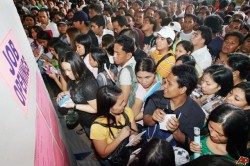- Home
- |
- About Us
- |
- Working Groups
- |
- News
- |
- Rankings
- WEF-Global Competitiveness Report
- Ease of Doing Business Report
- IMD-World Competitiveness Yearbook
- TI-Corruption Perceptions Index
- HF-Economic Freedom Index
- WEF-Global Information Technology Report
- WEF-Travel and Tourism Report
- WIPO-Global Innovation Index
- WB-Logistics Performance Index
- FFP-Fragile States Index
- WEF-Global Enabling Trade Report
- WEF-Global Gender Gap Report
- Gallery
- |
- Downloads
- |
- Contact Us
‘Philippines has to improve labor efficiency’

ASIDE from existing labor policies, moves by legislators might aggravate the Philippines’ position when it comes to labor market efficiency, an official warned.
Guillermo Luz, co-chair of the National Competitiveness Council, said that while the Philippines moved up 10 ranks from 85 to 75 in the World Economic Forum’s competitiveness rankings, it remains low on labor market efficiency.
Luz said that cannot be taken lightly.
Labor market efficiency, according to the WEF report, is described as the flexibility of the labor market to shift its workers from one economic activity to another rapidly and at a low cost.
It is also measured by the wage fluctuations, worker incentives and equity in the business environment.
For Luz, the situation is worsened by moves of legislators that tend to get a big chunk of media coverage.
“Trying to be popular can hurt the cause of the labor sector even more,” Luz said, adding that in these days of social media, news spreads faster and the coverage is wider.
He fears that moves by legislators can become unproductive for the economy.
He warned that the measure to put limitations on the number of hired contractual employees could actually work against the cause of labor. He said that while the measure was meant to encourage security of tenure, he warned that companies would be careful about hiring more workers.
Another suggestion that he felt ruins prospects for labor is the four-day work week, calling it “incredibly insane.”
Luz pointed out that investors track down competitive rankings and that our rankings have an impact on our attractiveness as a destination for investment and tourism.
The World Economic Forum’s global competitiveness index for 2011 to 2012 ranks the Philippines 75th out of 142 countries.
It trails behind its counterparts in Southeast Asia, with Singapore ranking second, Malaysia in 21st place, Thailand 39th, Indonesia 46th and Vietnam 65th. The only other Asean country behind the Philippines is Cambodia, which ranked 97th.
Aside from labor market efficiency, economies are measured on its institutions, infrastructure, macroeconomic environment, health and primary education, higher education and training, goods market efficiency, technological readiness, financial market development, market size, business sophistication and innovation.
Luz said the country’s labor market efficiency ranks among the bottom 20 percent of the world at 113 out of 142 countries.
Another aspect that Luz feels is often ignored is brain gain. He explained that the country is so used to exporting labor that there is no clear option for workers to return to the country and use their talents, newly acquired knowledge and networks to have a career at home.
Another problem he sees is that most business would say that the education sector is not producing the right level of skills required of its graduates.
original source: www.sunstar.com.ph

